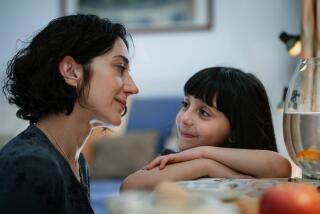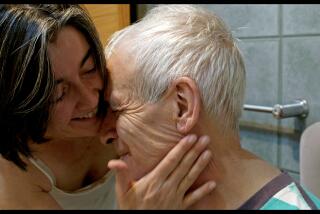Algerians transform nation’s agony into art
- Share via
PARIS -- A young teacher on her way to work is accosted by a former student and ordered to place a bomb-rigged satchel in her school. Refusing, she is shot and left to die.
We are in Algeria in the mid-1990s, at the peak of a brutal Islamic insurgency that has left an estimated 120,000 people dead. We walk through the horrors of those years in a singular journey captured in a feature-length film, “Rachida.”
It is Yamina Bachir-Chouikh’s debut movie, but she is not the first Algerian to have transformed her country’s decade of agony into art.
Violence continues there, but so do acts of redemption by a handful of Algerians plumbing the pain in a creative frenzy that, stroke by stroke, is giving form to what has become known as the “invisible war.”
Islamic extremists have waged a campaign of terror in the North African nation since 1992, first targeting journalists, foreigners and intellectuals before fanning into hamlets, villages and cities. The murky nature of the violence, and the scarcity of visas for foreign journalists, have kept the war largely behind closed doors.
Bachir-Chouikh’s brother, killed in 1995, was among the victims. “Rachida,” which opened in January in France, is dedicated in part to him. “I wrote [the movie] simply because I was in deep pain, like everyone else in Algeria,” she said in a telephone interview. “There were Algerians dying, and they had no faces. I wanted to talk about the human dimension of this violence and give it a face.”
Algeria has lost some of its leading artists to the violence, which erupted after the army canceled national elections that a Muslim fundamentalist party was poised to win. National Theater director Azeddine Medjoubi was gunned down by Islamic extremists in 1995. Noted playwright Abdelkader Alloula and the wildly popular singer Cheb Hasni were killed in 1994. Many others fled.
Now things are changing.
There is a revival of the arts in Algeria, says Benamar Mediene, an art history professor at the University of Aix-en-Provence, in France, noting that young painters now dare to evoke sexuality in their works.
The arts have become a “way to say no to death,” he says. Today’s artists are possessed by a “passion to try to pull a nation out of hell.”
As early as 1993, noted Algerian director Merzak Allouache tried to make sense of the crisis with “Bab El-Oued City,” a movie set in an Algiers neighborhood that was a cradle for Muslim fundamentalism and that saw jobless youths leap from zealous faith to violence.
Allouache revisited the crisis in 2001 with “L’Autre Monde” (The Other World).
With funding a critical problem and security a grave concern, artists work against the odds to bring their projects to life. Bachir-Chouikh wrote “Rachida” in 1996 but had to wait nearly five years for financing.
Her movie is based on real events, from a wedding massacre to the silent shame of young women abducted and raped by radical insurgents.
More to Read
Sign up for Essential California
The most important California stories and recommendations in your inbox every morning.
You may occasionally receive promotional content from the Los Angeles Times.













